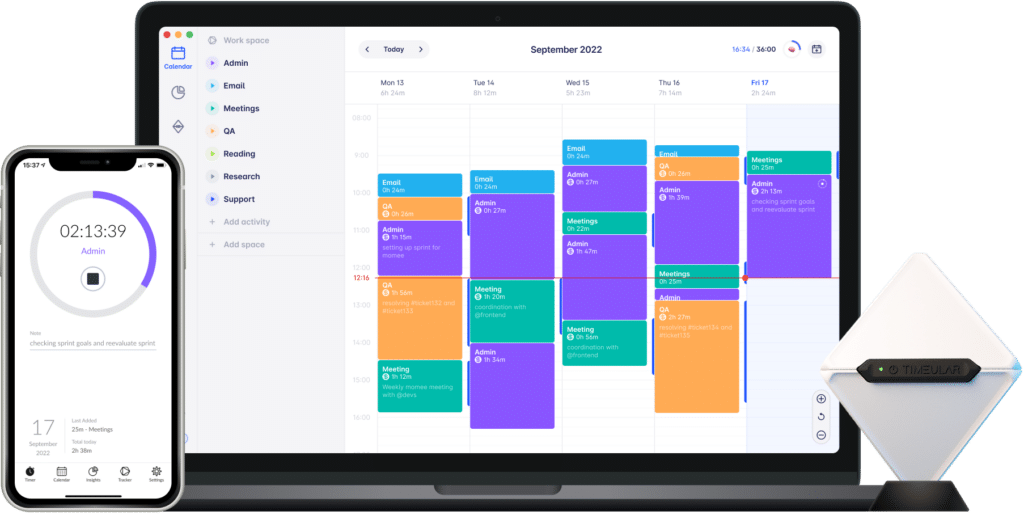Business Consultants Fees: How Much Should You Charge?
Business consultants play a crucial role in business as they help organizations improve their performance, solve many problems, and achieve their short-term and long-term goals.
Whether you work on a small start-up or in a large corporation, having a business consultant around can provide you with valuable insights, expertise, and guidance. Therefore, if you’re thinking about hiring a consultant, it’s important to understand how they charge for their services.

¿Alguna vez se preguntó cuánto tiempo usted y su equipo realmente dedican al trabajo de los clientes? Comience a realizar un seguimiento de su tiempo y capture el 100 % de su tiempo facturable
In this guide, we’ll explore everything about business consultant fees and the various factors that influence how business consultants set their fees.
So, how much do business consultants charge, and how do they charge for their services? Let’s find out!
What are business consultant fees?
A business consultant fee is a payment that a consultant receives from a company or an entity due to completing a project and service. This fee can be highly incremented if additional elements of work-related costs exist.

Types of business consultants’ fees
Here are some general ranges to provide you with an idea of the typical fees charged by business consultants:
Precio por hora
The hourly rate is when a consultant charges by the hour for the consulting services. They set an hourly rate, track their hours, and then bill the client by the hour.
The exact rate can depend on different factors, such as the consultant’s experience, expertise, industry, geographic location, and the project’s complexity. Many consultants manually fill out a timesheet Excel file to keep track of hourly rates. The downside of this method is that they often forget to update the file, leaving space for human error and second-guessing. A better method to keep track of time is to use an automatic time tracking software such as Timeular, the easiest software on the market to keep track of billable and non-billable hours. You can try it for free for 30 days.
Read: Time Tracking for Consultants: The Ultimate Guide

Timeularjunto con sus potentes funciones de elaboración de informes, hace que facturar sea una delicia.
Project-based fee
Some people may opt for the project-based fee instead of the hourly rate because it can give them a better sense of how much they will pay at the end.
When it comes to the hourly rate, it can be more uncertain to the client as they don’t know how much time the consultant will be working overall.
Using the project-based fee, the client already knows the final price from the beginning.
The fees can vary significantly based on the nature of the project and the consultant’s estimation of the work involved.
Read also: What is project billing and how it’s important to your success.
Retainer fee
Retainer fees are commonly used for ongoing services, meaning that this fee is usually a fixed amount paid monthly or quarterly to retain the consultant’s services.
The value of the retainer fees can vary widely depending on the level of involvement required and the consultant’s availability.
Value-based fee
Value-based pricing is when consultants price their services based on the tangible and intangible value they create for the clients.
Meaning that value-based fees are tied to achieving specific outcomes or performance targets. The consultant’s compensation is directly linked to the value they deliver to the client’s business.

Cómo vender con éxito servicios de consultoría
Are you struggling with selling consultant services? Become an expert with our guide!

Types of business consultants’ fees statistics
A recent study conducted by Consulting Success reveals the prevailing pricing structures employed by most consultants for their consulting services are:
- 31.37% of consultants use a project-based rate to price their projects.
- 23.38% of them use hourly billing
- 17.30% use value-based fees
- 15.40% use monthly retainers
- 12.55% of consultants charge daily
Read also: Top-rated client billing tools for offices
Factors that affect business consultants’ fees
Consultants charge fees for their services, taking into consideration many factors, such as:
Expertise and specialized know-how
Business consultants have specialized knowledge and expertise in particular industries or areas. Their skills and insights are honed through education, training, and experience.
Clients highly esteem this expertise and willingly pay fees to leverage the consultant’s valuable knowledge and guidance.
Time and dedication
Business consultants invest their time and effort in comprehending clients’ challenges, conducting research, analyzing data, devising strategies, and offering recommendations.
The fees they charge compensate for the dedicated time, effort, and intellectual overall investment to address the client’s needs effectively.

Don’t miss billable hours anymore!
“He estado usando Timeular “Desde hace casi 2 años. Me ayudó a llevar un registro de mi tiempo, las horas facturables a los clientes y a ganar negocios” – Fabian G., CTO
Business costs
Like any other professional that provides services, business consultants have their business costs to cover. These costs may include office space, equipment, software, insurance, and marketing.
The fees charged by consultants cover these costs and guarantee the long-term viability of their consulting practice.
Herramientas recomendadas:
- Calculadora de margen de beneficio
- Calculadora de rentabilidad
- Calculadora de tiempo
- Calculo horas extras
Market demand
The fees that consultants charge are also highly influenced by market dynamics, such as market factors and competition within the industry.
Business consultants possessing specialized skills, high demand, or limited availability can justify higher fees based on their unique value proposition.
Value creation
Consultants are hired to assist clients in resolving their issues, enhancing performance, and attaining targeted goals. Through their expertise, consultants offer invaluable insights, strategic recommendations, and practical solutions that generate tangible value for clients in the long run.
The fees they charge align with the delivered value and the positive impact on the client’s business.
Independence and objectivity
Business consultants provide an impartial and unbiased perspective as they remain detached from the client’s day-to-day operations.
This independence allows them to offer objective insights and recommendations. Clients appreciate this impartial viewpoint and are willing to invest in the consultant’s independent expertise.
It is worth highlighting that consulting fees are typically negotiated between the consultant and the client, considering the factors we mentioned and striving to establish a mutually satisfactory fee structure.
Open communication, transparency, and a comprehensive understanding of the value proposition are vital in determining appropriate consulting fees.

How much are the average business consulting fees?
The average hourly rate for business consultants in the US can range from $100 to $500 or more.
Higher rates are typically charged by consultants with extensive experience, specialized expertise, and a strong reputation in the business.
How to determine business consulting fees in 7 steps
Determining business consulting fees requires careful consideration of various factors to ensure that pricing is fair, competitive, and reflects the provided value.
So, if you’re a consultant, here are steps to help you determine your consulting fees:
- Conduct market research to understand industry standards and market rates for consultants in your area. This information will give you a benchmark to compare and adjust your fees accordingly.
- Evaluate expertise: assess your level of expertise and specialized skills and know-how. Factors such as your education, certifications, and professional experience, can allow you to set higher fees.
- Define your target: identify your target clients and understand their budgetary constraints, industry norms, and the value they seek from consulting services. This knowledge will help you align your fees with their expectations and financial capacity.
- Determine your cost: calculate your overall expenses, business overheads, and service delivery costs. This will help you establish a baseline for your fees.
- Find your value proposition: assess the distinctive value you bring to clients, such as innovative approaches, specialized methodologies, or niche market expertise. Determine how your unique offerings differentiate you from competitors to justify higher fees.
- Evaluate project complexity: evaluate your projects’ complexity, scope, and duration. More complex or longer-term projects may justify higher fees due to the additional time, effort, and expertise required.
- Set a pricing method: decide on one that better aligns with your business model and client preferences. As previously mentioned, standard methods include hourly rates, project-based fees, retainer fees, or performance-based fees.
Remember that setting your consulting fees is a balancing act. You want to charge a fair price that reflects the value you provide while remaining competitive in the market and meeting your financial goals.
Regularly reassess your fees to ensure they align with the changing market dynamics and your growing expertise.

8 most valuable tips for negotiating business consulting fees
Navigating the negotiation process for business consulting fees is significant in securing client contracts and establishing a mutually beneficial arrangement.
Here are a few tips that we believe can help you out:
- Understand client’s needs: clearly understanding your client’s requirements, goals, and financial limitations is essential. This understanding will enable you to customize your value proposition and fee structure to align precisely with their needs.
- Highlight your value: articulate your distinctive value to the partnership and elucidate how your services will contribute to the client’s business growth. Highlight the precise outcomes, cost efficiencies, or revenue expansion they can anticipate by collaborating with you.
- Be prepared: research industry standards, market rates, and competitor pricing so you have all the arguments on your side. Be prepared with various options and pricing models to accommodate your clients’ budgets and project scopes.
- Have service packages: Another great tip is to consider bundling your services into different packs that offer a clear value proposition instead of charging solely based on hourly rates. This can help clients see the overall value of your services rather than focusing exclusively on the hourly fee.
- Focus on ROI: ROI is the Return on Investment. Demonstrate to your clients how your value will exceed the fees charged, highlighting long-term benefits and potential cost savings.
- Prioritize win-win solutions: approach every negotiation with a cooperative mindset. Seek mutually beneficial outcomes that address your financial goals and the client’s budget limitations. Find creative solutions that add value while remaining within budget constraints.
- Display testimonials and case studies: sharing testimonials, success stories, and case studies that highlight your past achievements and client satisfaction can work as proof of the overall quality of your services and help you strengthen your position during negotiations, as well as build trust with the client.
- Be flexible and consider long-term relationships: if you see that a particular client has the potential for long-term engagement or repeat business, be open and flexible to adjusting your fees to reflect the value of the ongoing relationship. Sometimes, a slightly lower fee upfront can lead to more significant long-term benefits.

Boost productivity: How consultant Kasia took control of her time

Time tracking is crucial for business consulting
Time tracking is the act of monitoring every hour you’ve dedicated to a project, service, or task.
This process increases profit, efficiency, and productivity as a business consultant. So, it’s evident that
time tracking is critical for business consultants businesses.
Let’s explore in detail why time tracking is crucial for business consulting:
Accurate billing
As we already referred, consultants often charge clients based on the time spent on their projects.
Using time tracking, consultants ensure they accurately capture and record the time spent on various tasks. This allows consultants to invoice clients correctly and avoid disputes over billing.
Gestión de proyectos
Time tracking provides valuable data for project management as it allows consultants to correctly estimate the duration of a project, monitor time wasters, identify potential bottlenecks or inefficiencies, and adjust to keep projects on track.
It helps to stay organized, meet deadlines, and promptly complete project deliverables. Learn more about improving business efficiency.
Optimize profitability
By tracking time, consultants gain insights into how much time they allocate to different activities.
This information helps them evaluate the profitability of projects and identify areas where they may be spending more time than anticipated.
It enables them to make informed decisions to optimize resource allocation and control costs.
Read also: Resource allocation methods
Data-informed decisions
Over time, collected time tracking data can provide valuable insights into work patterns, project profitability, and client preferences.
Analyzing this data can help any consultant make informed business decisions, such as adjusting pricing structure, optimizing service offerings, or identifying general areas of improvement.
Evaluar el rendimiento
Tracking time helps consultants to assess productivity and performance.
By comparing the estimated time for tasks or projects with the actual time spent, consultants can identify areas where they excel and areas that may need improvement.
This self-evaluation allows consultants to enhance their efficiency and effectiveness continually.
Mutual trust
Time tracking data can provide clients transparency regarding the time and effort invested in their projects.
It helps to demonstrate the value of the consultant’s services and build trust by providing detailed reports or invoices.
Overall, time tracking is essential for effective business consulting as it supports all the information business consultants must give their clients: accurate billing, cost control, project management, performance evaluation, scope management, data analysis, and transparent client communication. By implementing robust time tracking practices, consultants can optimize their operations, enhance client satisfaction, and drive their business success.

PREGUNTAS FRECUENTES
How much should I charge as a business consultant?
It depends! The average business consulting fee is around $100 per hour, but consider your experience and expertise.
You may charge closer to $50 or $75 per hour if you are a brand-new business consultant. On the other hand, with more experience, you can charge $150 or even $200 per hour.
How much do business consultants charge for business plans?
The fees for business plan consulting can vary considerably due to several factors, such as the project’s complexity, the consultant’s experience and expertise, the geographic location, and the industry in which the business operates.
How much do small business consultant companies charge in the USA?
The average fee per hour is $100 when you’re working as a freelancer. Small business consulting fees range from $95 to $1,500, with an average cost of $399.
How much do business consultants charge in the UK?
The average price goes from £80 – £250 per hour. Like the USA, the fees for business consultants in the UK can vary depending on various factors, including the consultant’s experience, expertise, location, and the specific services being provided.
How much do business consultants make in Canada?
The average business consultant’s salary per year in Canada is $67,248.
How much do business consultants make a year?
According to Payscale, the average business consultant salary in the US per year is $78,943.
Conclusión
We hope we helped you understand more about business consultant fees and how business consultants charge for their services. The success of your consulting business also depends on how well you keep track of time. That’s why using a time tracking software like Timeular will help you boost your profitability and increase clients’ trust.
Determining the fees charged by business consultants involves considering multiple factors such as the consultant’s experience, project complexity, required time and effort, delivered value, and market dynamics.
Pricing models employed range from hourly rates to project-based fees, retainers, performance-based fees, or a blend of these approaches, whatever works best.
Before engaging a business consultant, it is crucial to truly comprehend the pricing structure and negotiate terms aligned with your budget and desired outcomes and goals.
Open communication and discussing expectations with the consultant promote a mutually advantageous agreement and enhance the likelihood of a successful consulting partnership.
Quizá le interese lo siguiente: